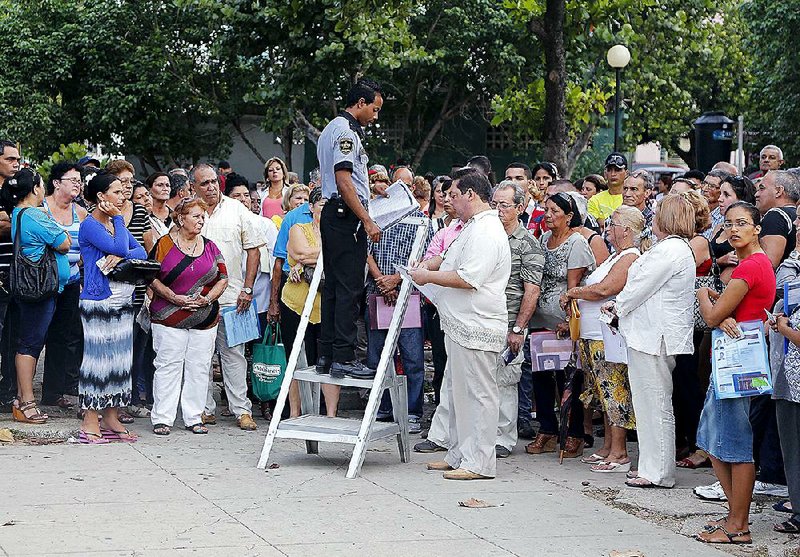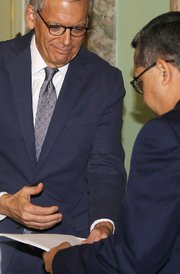WASHINGTON -- President Barack Obama urged Congress on Wednesday to follow his decision to reopen the American Embassy in Havana by lifting the U.S. trade embargo on Cuba.
"We don't have to be imprisoned by the past," Obama said at the White House. "Americans and Cubans alike are looking to move forward. I believe it's time for Congress to do the same."
The embassy will reopen July 20, when Cuba also will reopen its embassy in Washington. Secretary of State John Kerry intends to go to Havana to "proudly raise the American flag over our embassy once more," Obama said.
Kerry's visit will be the first trip to the island by the top American diplomat since 1945.
Jeffrey DeLaurentis, who heads the limited U.S. diplomatic outpost in Havana, known as an interests section, is to be the initial envoy heading the reopened embassy. He delivered a letter from Obama confirming the plans to Cuba President Raul Castro, according to Cuba's Foreign Ministry.
Announcing the embassy agreement Wednesday, Obama declared: "This is what change looks like."
Cuban television broadcast Obama's statement live. In a letter to Obama, Castro, the brother of former leader Fidel Castro, praised the embassy announcement as a way to "develop respectful relations and cooperation between our peoples and governments."
President Dwight D. Eisenhower cut diplomatic ties with Cuba in 1961 after President Fidel Castro's decision to nationalize foreign assets, including U.S. property, on the Caribbean island. The next year the U.S. trade embargo was extended to include almost all imports.
To complete the process of normalizing ties with Cuba, Obama will need to get the trade embargo lifted and get a U.S. ambassador to Cuba confirmed by the Republican-controlled Senate. Obama hasn't decided whether to nominate an ambassador in the immediate future or keep it operating under DeLaurentis as charge d'affaires, an administration official said Wednesday.
Florida's Sen. Marco Rubio, who is seeking the Republican presidential nomination, has said he would block any ambassador nominee offered by the White House. Ted Cruz, a U.S. senator from Texas who is also seeking the party's nomination, has echoed that threat.
Other critics of Obama's opening to Cuba quickly denounced his latest move.
House Speaker John Boehner, R-Ohio, said in a statement that the administration "is handing the Castros a lifetime dream of legitimacy without getting a thing for the Cuban people being oppressed by this brutal communist dictatorship."
Sen. Bob Menendez, D-N.J., a staunch opponent of re-establishing relations with Cuba, accused Obama of trying to burnish his legacy at the expense of the Cuban people.
"Our demands for freedoms and liberty on the island will continue to be ignored, and we are incentivizing a police state to uphold a policy of brutality," he said in a statement. "The message is democracy and human rights take a back seat to a legacy initiative."
Acknowledging that the United States and Cuba continued to have "sharp differences" over human rights, Kerry said Wednesday that reopening the embassy would enable U.S. officials to "engage the Cuban government more often and at a higher level."
"This step has been long overdue," Kerry added.
The Republican-led House Appropriations Committee voted last month to curb Obama administration efforts to work on an embassy in Cuba unless the White House certifies that Havana is meeting the terms of a 1996 law aimed at pushing Cuba's government toward democracy. That law's conditions include Cuba's extradition of people who are accused of crimes in the U.S.
Since the late 1970s, the United States and Cuba have operated interests sections in each other's capitals that are technically under the protection of Switzerland and do not enjoy the same status as embassies. With the diplomatic infrastructure already in place, administration officials said any efforts by Congress to block funding for an embassy would be unsuccessful in preventing an upgrade to the American post in Havana.
The thaw in U.S.-Cuba relations is seen by the White House as a central part of the president's foreign-policy legacy. Obama has long argued that the U.S. policy of isolating Cuba, a country just 90 miles south of Florida, has been ineffective in forcing change.
Obama said it's "long past time" to realize that trying to isolate Cuba hasn't worked and that the best way to advance U.S. interests is through engagement. He said there are tourists who want to travel to Cuba and businesses that want to invest there.
That theme was picked up by supporters of renewing ties to Cuba. Sen. Chris Murphy, D-Conn., said U.S. policy has failed to force a change in Cuba's government and instead has been a source of friction with other countries in Latin America.
The U.S. and Cuba announced in December, after months of secret talks aided by the Vatican, that they were moving to end Cold War hostilities. Since then, officials have been locked in negotiations over terms for opening embassies.
U.S. diplomats in Cuba will have fewer restrictions on their movements than they do now, according to an American official who didn't disclose how much leeway to travel outside Havana was obtained in negotiations. The revised restrictions also will apply to Cuban diplomats in the U.S.
Future talks will deal with U.S. claims over property expropriated by the Cuban government and the return of U.S. fugitives in Cuba, according to the official, who briefed reporters on condition of anonymity. The official said Kerry's ceremonial visit may not come until sometime after the embassy is opened.
Cuban authorities had their own list of unsettled business. Further normalization will be a "long and complex process," according to a statement on the website of the state-run newspaper Granma, with one significant impediment.
"'There cannot be normal relations between Cuba and the United States as long as the rigorously applied economic, commercial and financial blockade continues," the statement said.
The thaw between the U.S. and Cuba has triggered an explosion of interest in the island nation from businesses and governments worldwide. They're betting that the prospect of a tourist boom will unleash the $68 billion Cuban economy through development.
Deere & Co., Marriott International Inc. and Corning Inc. are among companies that accelerated lobbying related to Cuba in the first three months after Obama's announcement in December, according to Bloomberg Intelligence.
Cuba's government anticipates that 10 million Americans eventually will visit annually as travel restrictions are liberalized, up from about 1 million this year. The country now receives about 3 million foreign visitors a year, mostly from Canada and Western Europe, according to the government's data.
U.S. state governors are jockeying to get trade delegations to Cuba to promote agricultural products and business deals.
After New York Gov. Andrew Cuomo led a mission to Cuba, officials said they made four deals, including one with JetBlue Airways Corp., which will offer direct flights between New York and Havana starting this week.
France, the U.K. and Japan are among the countries also seeking to bolster trade. China recently signed a deal with Cuba's Ministry of Tourism to build a golf course on the island.
Information for this article was contributed by Margaret Talev, Indira A.R. Lakshmanan, Justin Sink and Ezra Fieser of Bloomberg News; by Julie Pace, Peter Orsi, Bradley Klapper and Alan Fram of The Associated Press; and by Julie Hirschfeld Davis of The New York Times.
A Section on 07/02/2015

